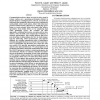Free Online Productivity Tools
i2Speak
i2Symbol
i2OCR
iTex2Img
iWeb2Print
iWeb2Shot
i2Type
iPdf2Split
iPdf2Merge
i2Bopomofo
i2Arabic
i2Style
i2Image
i2PDF
iLatex2Rtf
Sci2ools
97
Voted
ISPASS
2005
IEEE
2005
IEEE
Reaping the Benefit of Temporal Silence to Improve Communication Performance
Communication misses--those serviced by dirty data in remote caches--are a pressing performance limiter in shared-memory multiprocessors. Recent research has indicated that temporally silent stores can be exploited to substantially reduce such misses, either with coherence protocol enhancements (MESTI); by employing speculation to create atomic silent store-pairs that achieve speculative lock elision (SLE); or by employing load value prediction (LVP). We evaluate all three approaches utilizing full-system, execution-driven simulation, with scientific and commercial workloads, to measure performance. Our studies indicate that accurate detection of elision idioms for SLE is vitally important for delivering robust performance and appears difficult for existing commercial codes. Furthermore, common datapath issues in out-of-order cores cause barriers to speculation and therefore may cause SLE failures unless SLE-specific speculation mechanisms are added to the microarchitecture. We also p...
| Added | 25 Jun 2010 |
| Updated | 25 Jun 2010 |
| Type | Conference |
| Year | 2005 |
| Where | ISPASS |
| Authors | Kevin M. Lepak, Mikko H. Lipasti |
Comments (0)

